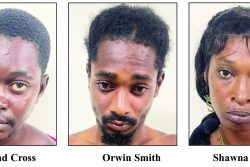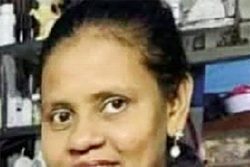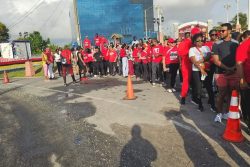Goodison, who is among the top-flight Caribbean writers started poetry while at school, studied Fine Arts and started her career as an artist before returning to poetry full time. She has mixed white ancestry which, like Derek Walcott, she has used as a theme in her poetry. It has led her into verses celebrating heritage which may be counted among her work which can be highlighted as poetry to commemorate the IYPAD. Also like Walcott, whose first ambition was to be a painter, she has still had exhibitions of her art. Her most acclaimed publications include I Am Becoming My Mother (1986 winner of the Common-wealth Writers Prize America Region), Heartease (1988), Selected Poems (1992) Guinea Woman (2000) and Goldengrove (2005) as well as short story collection Baby Mother and the King of Swords (1990).
This consciousness of the African heritage has been foremost in Goodison’s output and has produced among many others, poems of tribute – mainly to black women – poems of heritage, poems of ancestry and poems of history. “Mother the Great Stones Got to Move,” deals with historical hindrances to black progress, including interpretations of history and conditions necessary for liberation. It is addressed to “Mother” and indeed, woman and mother are important preoccupations of Goodison. Some of the poems in this group are autobiographical since the heritage and ancestry some of them refer to are her own. “For My Mother, May I Inherit Half Her Strength” is based on family history which Goodison interweaves with a tribute to her mother. The poem is based on facts and Goodison once said her mother upbraided her for publicising their private business. “Guinea Woman” is about her great grandmother and explains how her lineage became mixed with European blood. In a number of poems she refers to her and her family’s “high yellow” colour. “For Rosa Parks” is an obvious tribute to that heroine of the American Civil Rights resistance.
Guinea Woman
Great grandmother
was a Guinea woman
wide eyes turning
the corners of her face
could see behind her
her cheeks dusted with
a fine rash of jet-bead warts
that itched when the rain set up.
Great grandmother’s waistline
the span of a headman’s hand
slender and tall like a canestalk
with a guinea woman’s antelope-quick walk
and when she paused
her gaze would look to sea
her profile fine like some obverse impression
on a guinea coin from royal memory.
[. . .]
(Lorna Goodison)
In addition to the biography of her ancestor the poem mentions her Guinea heritage and much more. The physical description of her face includes the wideness of her eyes which almost look as if she could see behind her. But it goes further than that, into a reference to the supernatural powers of the obeah woman who would literally be able to “see behind her.” Coupled with that is the gaze looking out “to sea,” which may suggest memory of the Middle Passage and a longing to re-cross it to return to Guinea. In fact, as an African, she would have had the power to fly across the Atlantic, a power that they lost after coming to the Caribbean.
Nanny
My womb was sealed
with molten wax
of killer bees
for nothing should enter
nothing should leave
the state of perpetual siege
the condition of the warrior.
From then my whole body would quicken
at the birth of every one of my people’s children.
I was schooled in the green-giving ways
of the roots and vines
made accomplice to the healing acts
of Chainey root, fever grass and vervain.
My breasts flattened
settled unmoving against my chest
my movements ran equal
to the rhythms of the forest.
I could sense and sift
the footfall of men
from the animals
and smell danger death’s odour
in the wind’s shift.
[. . .]
(Lorna Goodison)
Spiritual powers is also a main subject in the poem about Nanny Queen of the Maroons (1686-1733) who led the Jamaican maroons in battle against the British in the Maroon Wars which actually won the rebels some amount of independence. Nanny Town in Portland became almost sovereign Maroon territory and the rebel queen has been made a Jamaican National Hero. Both historical records and oral history laud her as an obeah woman who used her powers in the battles to monitor enemy movement, protect her troops and heal wounds. These powers are referred to in the poem.
More than that, the poem is a declaration by Nanny of what is almost a pact she entered into since her powers came with some degree of personal sacrifice. It reflects the ‘conflict’ or the tension that exists between the warrior and the woman, who, much like Lady Macbeth, had to be “unsexed” to gain strength to be a combatant. Nanny gave up the ability to conceive in order to gain the spiritual asceticism for her obeah powers. Instead she became the symbolic mother of all members of her community. Folklore has it that she could catch bullets and deflect them back at the enemy soldiers. The poem plays on her spiritualism and her oneness with the forest.
The River Mumma Wants Out (Excerpt)
You can’t hear? Everything here is changing.
The bulrushes on the river banks now want
to be palms in the king’s garden. (what king?)
The river is ostriching into the sand.
Is that not obvious? the nurse souls ask.
You can’t take a hint? You can’t read a sign?
Mumma no longer wants to be guardian
of our waters. She wants to be Big Mumma,
dancehall queen of the greater Caribbean.
[. . .]
(Lorna Goodison)
Goodison’s interest in the folk traditions continue in ‘The River Mumma Wants Out.‘ The poem dramatises change which has wrought a movement away from traditions, the folk spiritual heritage and brought either acculturation or a kind of commercial popular culture. The river mumma (ribba mumma) is a goddess or a spiritual creature of the river with the form of a mermaid and powers to harm and heal. She protects the water and the animals living in it and she has human devotees who make offerings or sacrifices to her. In this satirical poem she wants to abdicate her traditional position to join the lure of the popular modern culture of commercial interests.
Goodison represents this desire as a ‘natural’ contemporary development, which is obviously the trend followed by everyone today. This development comes over in the poem as cultural diffusion and something important lost. It is a loss of identity and cultural heritage. Strangely, she includes dancehall among the negatives, which it is not, but it does represent a different form and outlook which run counter to the traditional folk.
The folklore involved in the poem is a part of the African heritage in the Caribbean. River Mumma is the Jamaican equivalent to the Guyanese Water Mamma or Minje Mama or St Lucian Mama Glo. She is a positive figure protective of the environment and when, as in this poem, she wants to give up it reflects unwanted trends in the contemporary Caribbean. This is Goodison’s theme in this poem with a dramatization of contemporary change which is worrying.








